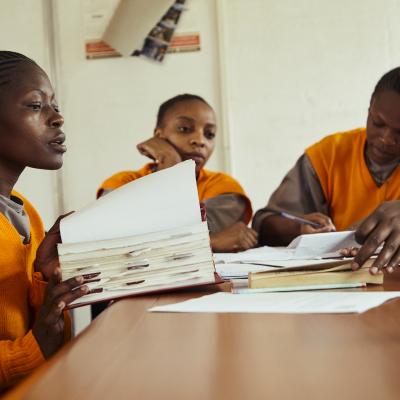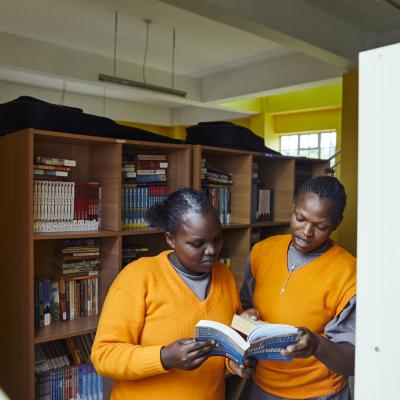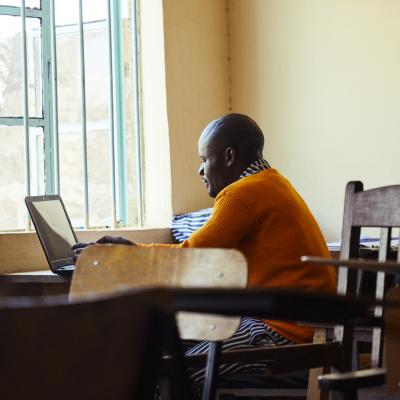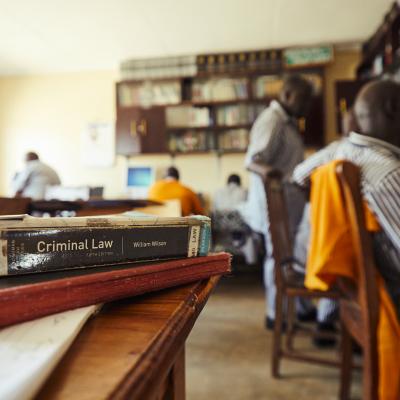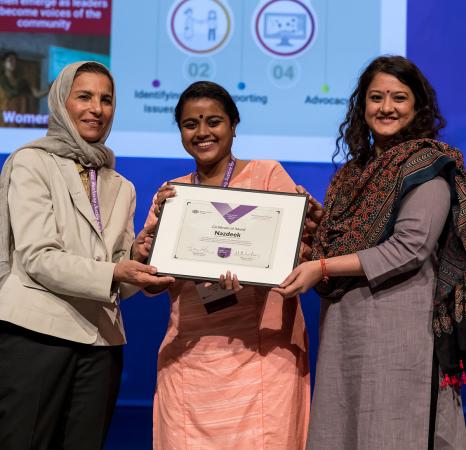World Justice Challenge 2021 Winner!
Access to Justice for All
Project Pitch and Q&A
Watch Justice Defenders' World Justice Challenge project pitch and join WJP's World Justice Challenge 2021 Community Forum to ask questions to project representatives, explore additional resources, meet new colleagues, and more. Join the discussion and help us build stronger rule of law values, institutions, and communities around the world.
Ask your question at the Community Forum
Project Summary
Justice Defenders aims to make justice and fair trial accessible to prisoners in Africa through legal education, training, and practice. In 46 prisons across Kenya and Uganda, we train defenseless communities—prisoners and prison staff—to become paralegals and lawyers, equipping them with legal skills and knowledge to assert their rights and provide legal services for themselves and others. To keep the wheels of justice turning in COVID-19, we have made our paralegal training available virtually, and we are linking prisons to courts so judges can hold virtual courts.
Problem Statement
Globally, 10 million people are imprisoned, three million of whom are held awaiting trial. As prisons in Kenya and Uganda typically operate at between 200% and 300% capacity, the prisoners endure living in congested cells, at high exposure to communicable diseases. In the face of a global pandemic, these inmates are at high risk of contracting and spreading COVID-19.
The prison communities comprise a majority of whom come from poverty and are at a disproportionate risk of conflict with the law by the nature of their social and economic status. It is also common for these inmates to have only completed primary school, making it difficult for them to navigate court systems or to afford legal services when they are arrested. The problem is rooted in systemic barriers that prevent prisoners—especially those from disadvantaged backgrounds—from accessing justice.
These barriers include the costs and shortages in legal services for the majority. Ninety percent of the prisoners we serve are unable to move their cases forward because they don't have legal representation or are unable to pay fines. A substantial number of these cases are non-violent, petty offenses that don't warrant the inordinate period of time that detainees could spend in prison. To illustrate: one of our clients was arrested because they couldn't pay their motorcycle insurance. Another client was wrongly accused by police of stealing produce when he accepted yams as payment for a day's work.
Beyond affordability, there is only one lawyer for every 27,258 people in Uganda and for every 5,686 people in Kenya. It is not unusual for inmates to wait up to a decade for a trial. Prisoners are often left to navigate the justice system alone. Without basic knowledge of their rights and legal options, they are prone to suffering unfair and prolonged incarceration without appeal.
Project Description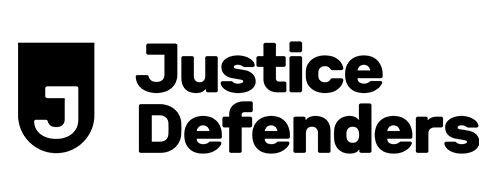
We aim to provide access to justice and fair trial by providing prisoners and prison staff with the legal training necessary to empower inmates to defend themselves and others in court.
Working closely with the Kenyan and Ugandan Prison Services, we select reliable, motivated program participants who undergo paralegal training, learning about all aspects of the criminal justice system (from the court hierarchy, appeals, constitutional law, and human rights, to criminal procedure, including what constitutes a fair trial, bail, and plea bargaining, to the law of evidence and sentencing). Our paralegals work in our Legal Aid Offices in prison, providing legal support for other inmates, including preparing appeal documents, drafting court submissions, and preparing for self-representation. In June, our Kenya team piloted a successful virtual delivery of this online paralegal training program.
In tandem with our paralegal training is our virtual courts initiative. With the lockdown reducing court capacity, the judiciary faces an increase in case backlogs and the number of prisoners held on remand, worsening prison congestion. Justice Defenders is linking prisons to courts so judges can hold virtual courts to deliver speedy justice—resolving the cases of those who have sufficiently served their time, giving access to fair hearings to those awaiting trial, and minimizing disease spread.
To date, our trained paralegals have served over 30,000 prisoners in individual case resolution, resulting in over 15,000 fair trials and releases and 69 overturned death sentences. Since we launched our COVID-19 digital response, Justice Defenders facilitated 13,340 online court hearings; virtually trained 158 new paralegals—both inmates and prison officers—at seven prisons; and delivered 320 virtual legal education, training, and practice sessions across Uganda and Kenya. Through strong cooperation with key government partners, there are now 250 active paralegals across 23 prisons in Kenya and Uganda, equipped with the skills to to prepare themselves and other defenseless people in prison for court representation and work in our legal aid clinics.
Susan Kigula was our program's first female inmate participant and led a case, "Susan Kigula and 417 Others vs. Attorney General, 2009," that resulted in the abolishment of mandatory death sentences for murder and armed robbery in Uganda. Another trained paralegal from Kenya, Morris Kaberia, also led a successful petition that led to the Supreme Court ruling against the discriminatory exclusion of sentenced prisoners from remission considerations.
Project Impact and Potential for Scaling, Replication, and Sustainability
Justice Defenders' work reimagines the way inequities in the criminal justice system are addressed by working directly with prisoners to transform the system. We believe our model is a replicable, low-cost solution to the global justice gap. It has proven to be replicable through our work in 46 prisons across Kenya and Uganda, which can benefit a country's entire prison population, including women, youth, and those in rural areas.
Our paralegal training program—and potentially our virtual courts initiative—can be applied in multiple contexts where there is a justice gap. By leveraging technological tools to create further impact in a sustainable, low-cost way, we anticipate being able to maintain our current operations as well as bring our legal education and training model to new prisons and communities. Justice Defenders views this initial investment in e-justice initiatives as helping pave the way for institutionalizing virtual justice systems in East Africa. We aim to roll out our digital paralegal training and virtual courts in further prisons. This will allow more inmates and prison staff to attend court hearings and paralegal training remotely, particularly in the wake of COVID-19, increasing access to justice and to fair hearings. As part of our growth strategy, we aim to scale our model to two new prisons in 2021 wherein we have identified the need for legal aid. As we grow and receive further funding and support, we will continue to replicate our model in other defenseless communities, having already identified 42 other prisons in need of our legal services. We have also received requests to roll-out not only in other prisons in Uganda and Kenya, but in Ghana, Nigeria, Tanzania, and Sudan.
Our approach remains firmly people-centered, affordable, adaptable, and collaborative when we are able to replicate our model in prisons lacking justice. We work with and invest in innovation, and partner on the basis that our allies embrace the same approach. Such as in the Gambia, where we are piloting a virtual paralegal training, we have the shared commitment and engagement from various key stakeholders (the police, the judiciary, Ministry of Justice, prison service, legal aid, and other nonprofit organizations) to replicate our virtual paralegal training in prisons there. Our scaling strategy is hinged on the replication of our increasingly virtual model, for which we require new countries and communities to allow technology to be introduced for us to deliver our work.
Submit Your Questions and Get Ready to Pick a Winner!
Representatives of World Justice Challenge 2021 finalist projects are on hand to answer your questions. Join our online Community Forum to engage with finalists, share resources, and network with other members of the rule of law community. Submit your questions now and get ready to vote for your favorite project—voting opens in mid-April!
Join the Conversation
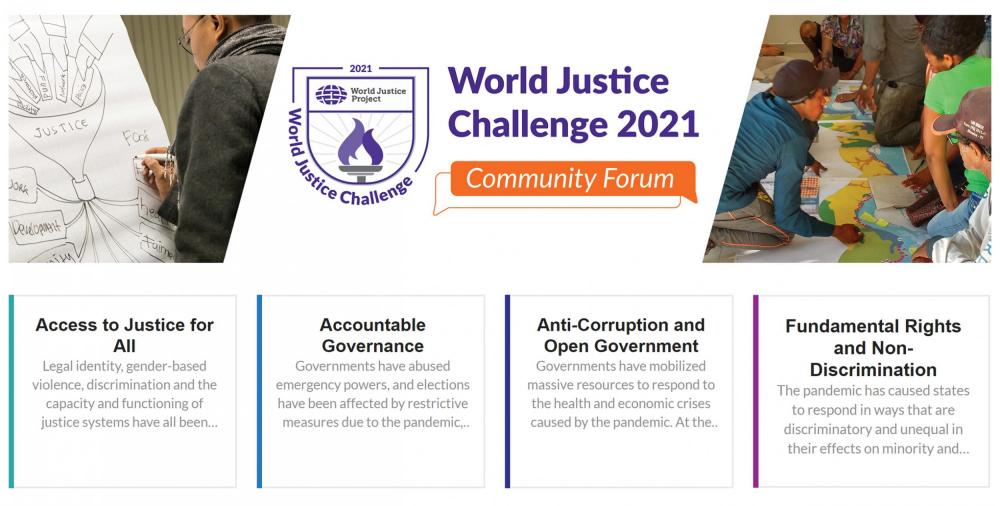
Program Photos
(Click to expand)
